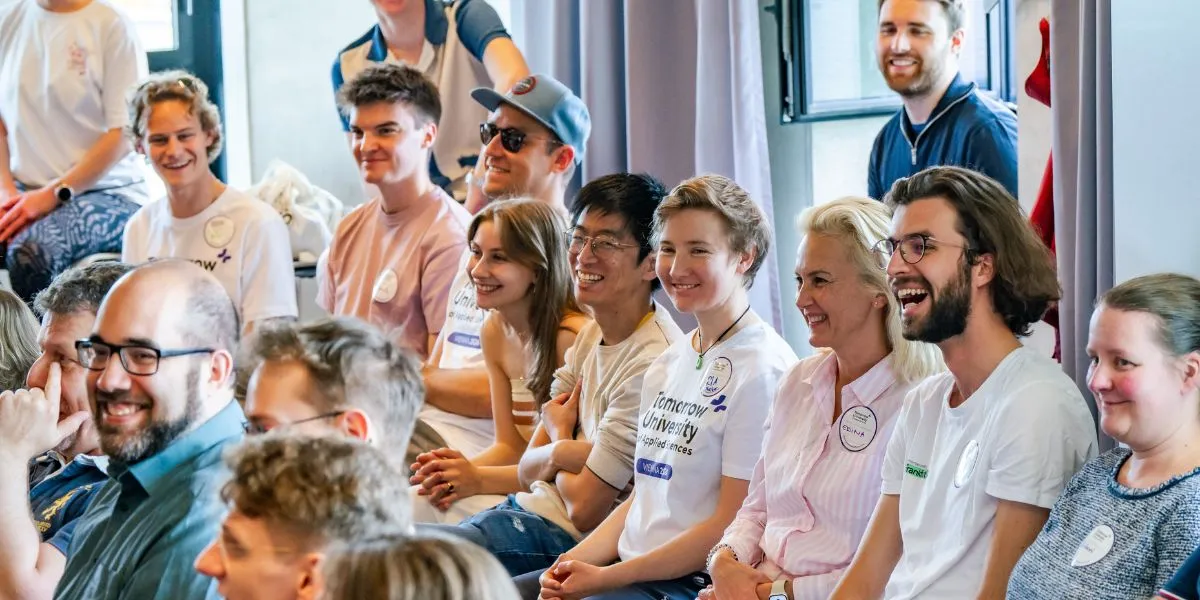How AI Is Reshaping the Future of Education
Artificial Intelligence is revolutionizing how we teach and learn. But with great potential comes complexity. This post breaks down how AI is shaping the future of education—from personalized learning tools to questions of ethics and data privacy. How to Build the Organization of the Future If you're curious about tech in the classroom, read on.

Diving into artificial intelligence (AI) with the guidance of Nellie Marangou, Program Director for AI & Sustainable Technology at Tomorrow University has reshaped how I view the future. The rumours are true: AI has immense potential to better our world! However, Nellie showed me a vital consideration: AI by itself won't seamlessly transition us to an ideal future. Being a product of human ingenuity, AI often mirrors our society’s limitations and flaws, particularly concerning diversity and gender equality.
I'm Merilyn Tammaru, a Bachelors students at Tomorrow University. In this blog story I'll share some of the insights that Nellie uncovered for us about the role of AI in gender diversity.

What is AI's role in shaping the gender gap?
Despite all the advancements, the tech world is still grappling with gender diversity, with women's representation painfully low.
A study by the World Economic Forum highlights that gender diversity in the technology sector remains a global challenge, with female representation ranging from 12% to 34% across various countries [1]. As we lean more into automation and AI, there's a real risk that these gaps could widen further. It's not just speculation; studies are showing that without mindful intervention, AI could entrench existing inequalities even deeper [2].
4 ways in which AI can widen gender gaps
- AI-driven hiring tools have faced scrutiny for perpetuating existing gender imbalances. Amazon scrapped an AI recruitment tool in 2018 as it was biased against female candidates but recently multiple businesses are turning again to AI to improve efficiency in their hiring processes.
- In the financial sector, algorithms used for credit scoring have faced criticism for lacking transparency and potentially reinforcing gender-based financial discrimination.
- Voice-activated AI assistants often default to female voices with a recent UNESCO report showing that over 90% of voice-activated AI systems have female voices, reinforcing gender stereotypes and potentially influencing societal perceptions of women [3].
- AI algorithms in healthcare can exhibit gender biases, impacting diagnoses and treatment recommendations. A study published in the journal Science Translational Medicine found that a commercially available AI system for diagnosing heart disease showed significant disparities in its accuracy, with a higher rate of misdiagnosis for women compared to men [4].

The road to inclusive AI
We need a shift, not just in how we develop AI but in how we think about technology's role in society. We're talking about building AI that truly understands the diverse world it serves, ensuring it's as inclusive as it is innovative. So, what do we do?
- First off, we need transparency like never before. Understanding how AI makes its decisions is step one to spotting and correcting biases.
- Increasing diversity in tech isn't just nice to have; it's essential. More perspectives at the development stage mean AI that better reflects everyone.
- Lastly, this idea of Human-Centered AI isn't just academic. It's about creating technology that respects and enhances human values, ensuring advancements benefit us all, not just a select few.
Building tech for societal good with Tomorrow University
As students and future leaders, we're at a critical juncture: the technologies we build today will shape the world we live in tomorrow. For many of us at Tomorrow University, the journey is just beginning, with many opportunities ahead to make a real difference.
With the insights and support of our community at Tomorrow University, including the insights shared by dedicated faculty like Nellie, we're setting a course for a future where AI doesn't just make our lives easier, but it actually makes our society better.
For those interested in exploring the opportunities to use AI to build a more equitable future, this is how Tomorrow University can support your journey:
- Tomorrow University's curriculum emphasizes practical learning with purpose, enabling learners to not only grasp AI usage, but also to apply it ethically for societal betterment, by covering the ethical considerations, pitfalls, and best practices in AI development.
- All of Tomorrow University's degree programs have at least one technology or AI-related elective module, such as the Impact Certificate Leading with Technology, teaching about cognitive systems and AI-human collaboration towards shared goals.
- Tomorrow University offers a variety of 3-month courses and full degree programs that equip learners with the skills to use AI for positive impact, ensuring a comprehensive understanding of AI's ethics, challenges, and practical applications:
3 month courses: Build a better society with AI, Innovate ethically with Data & AI, and Human-Centered AI
Degree programs: BSc. in Artificial Intelligence & Sustainable Technologies and Impact MBA
Learn more about our courses in AI & Sustainable Technology to start building a future you’ll be proud of.
About Nellie Marangou

Nellie is the Program Director for AI and Sustainable Technologies at ToU, blending her passion for social mobility and diversity with her background in education technology, data analytics, and physics. Her work includes pioneering research in data analytics at Imperial College London on dark matter. Beyond research, Nellie is committed to promoting diversity in the data sector by shaping programs to support emerging leaders, especially from underrepresented groups, to excel in data-related careers. Follow Nellie's work on LinkedIn.
References
[1] Reference: National Center for Women & Information Technology. (2021). Women in Tech: The Facts.
[2] References: World Economic Forum. (2020). The Global Gender Gap Report 2020.
[3] Reference: UNESCO. (2019). I'd Blush if I Could: Closing Gender Divides in Digital Skills Through Education.
[4] Reference: Obermeyer, Z., Powers, B., Vogeli, C., & Mullainathan, S. (2019). Dissecting Racial Bias in an Algorithm Used to Manage the Health of Populations.

.svg)
.svg)
.svg)



.webp)




.webp)
